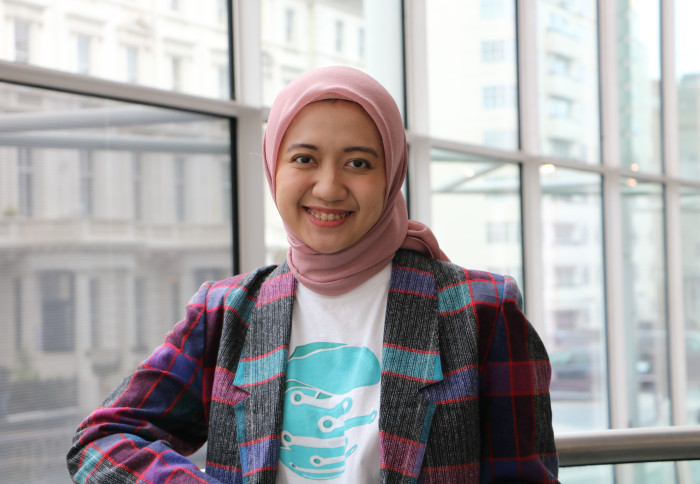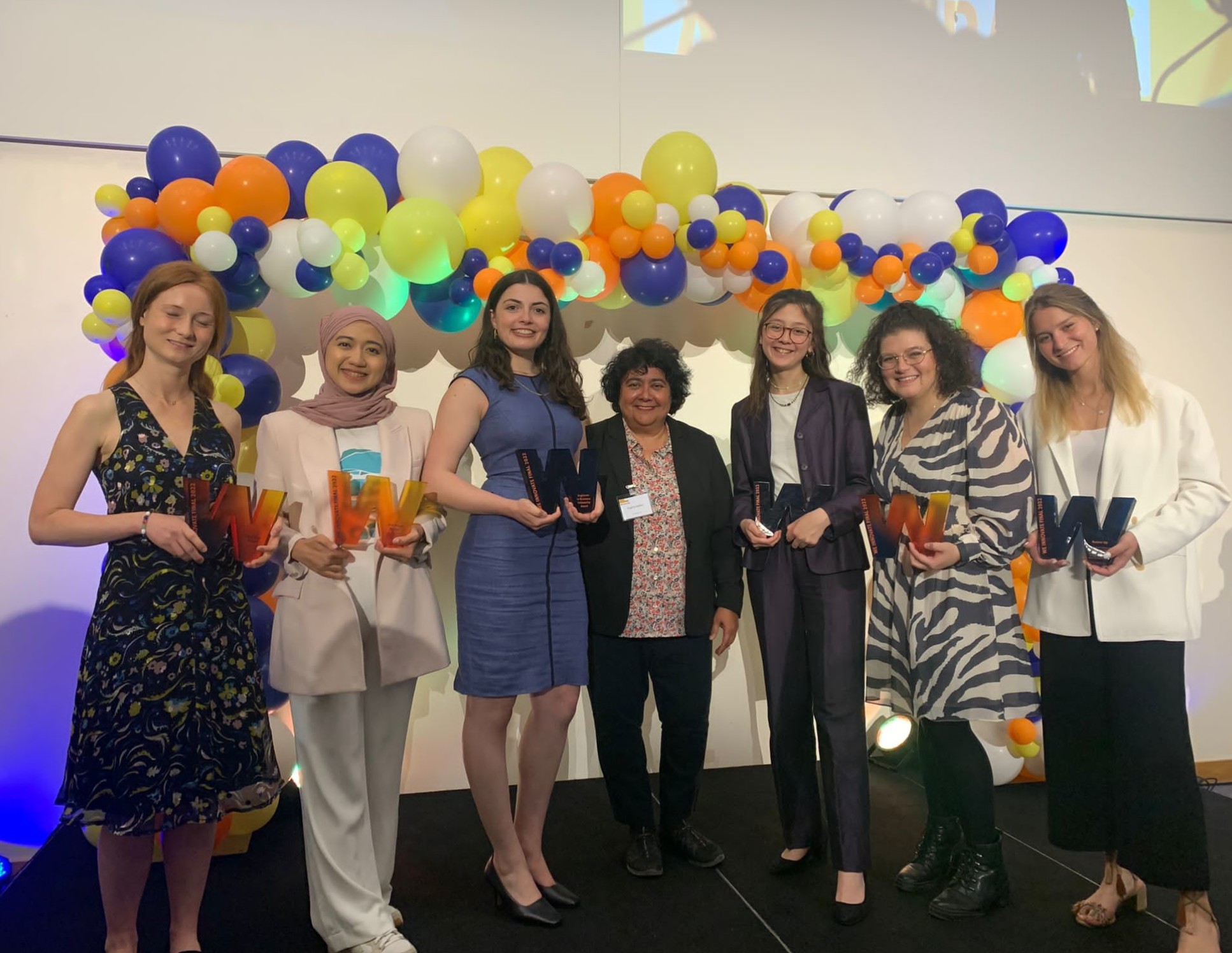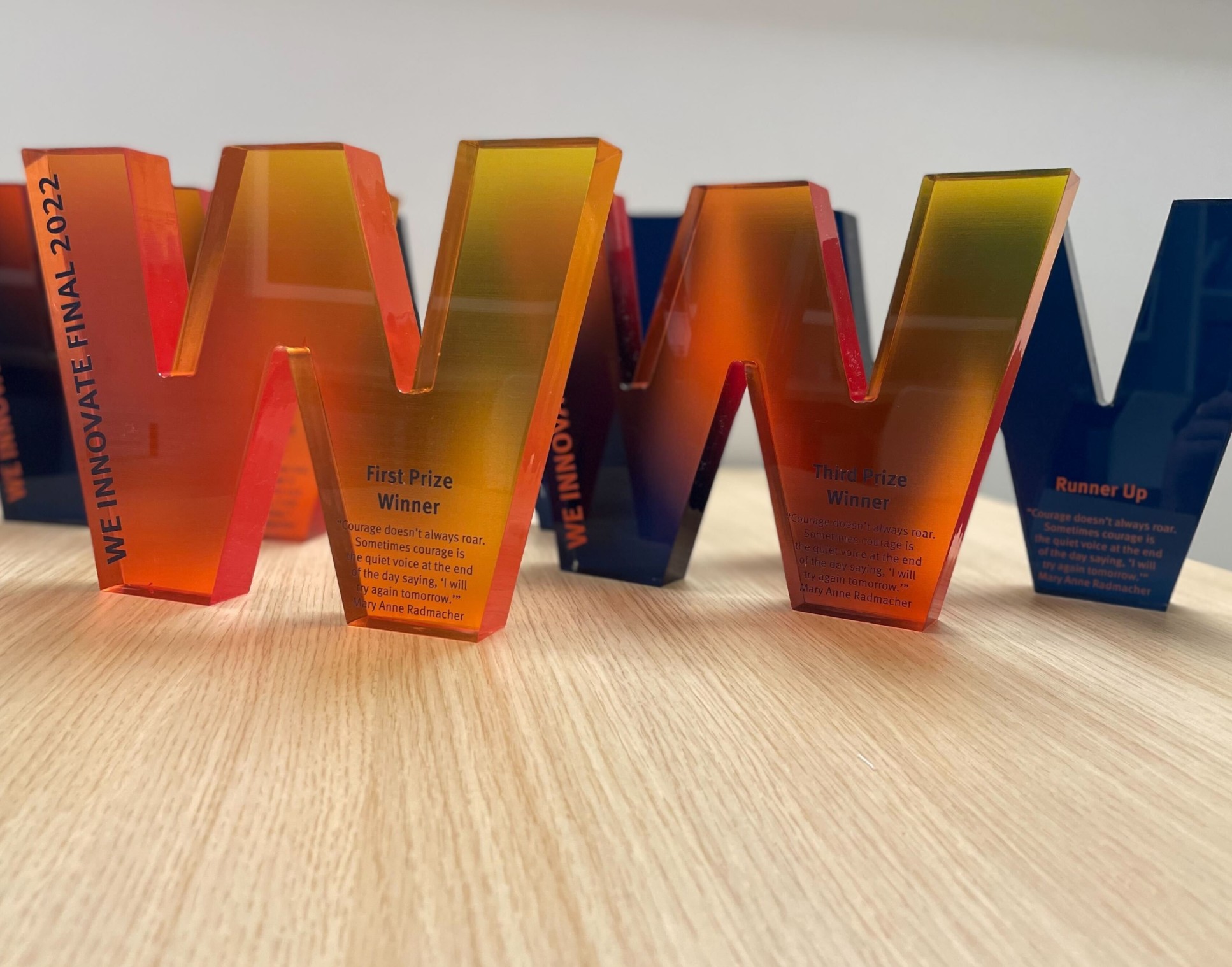Mobile app for fish farmers wins Imperial's top prize for women entrepreneurs

An Imperial student startup has developed affordable and integrated technology for fish farmers to monitor and troubleshoot water quality issues.
Banoo, co-founded by Selly Shafira, a student on the MSc Innovation, Entrepreneurship & Management at Imperial College Business School, won the £15,000 top prize in the WE Innovate Final on 22 June for their technology to support fish farmers in Indonesia to be more productive.
WE Innovate is a women’s entrepreneurship programme run by Imperial Enterprise Lab designed to inspire and accelerate the progress of women entrepreneurs. At the in-person final, five finalists went head-to-head in the hope of winning a share of a £30,000 prize pot, sponsored by bp.
Over the past 8 years, this game changing programme has provided a wide range of opportunities to women interested in entrepreneurship, from developing business ideas and entrepreneurship skills to raising investment and networking.
Aquaculture technology
According to the team, climate change has affected water quality for aquaculture (the practice of fish or seafood farming), increasing the risk of fish mortality and inefficient cultivation. They say farmers can no longer rely on traditional methods to predict weather or water quality, which creates huge profit loss without immediate troubleshooting. While Indonesia has immense potential for aquaculture, the team say, water quality is low as fishponds don’t have good oxygen circulating systems, resulting in unhealthy fish and toxic waste.
Banoo’s solution is an affordable and integrated aquaculture technology for fish farmers to monitor and troubleshoot water quality issues in real-time through an Internet of Things (IoT) system including microbubble aeration system, water quality sensor, and mobile apps which enable farmers to monitor their ponds remotely.
This programme has been helping us so much, from IP to customer discovery. We’ve launched thanks to WE Innovate. Selly Shafira CEO of Banoo
The team’s system floats on the water of the fish farming ponds, producing micro-sized bubbles to increase dissolved oxygen in the water and improve water quality. In turn, this improves the metabolism of the fish and increases their appetite, and as the fish eat more, less fish food will end up as waste at the bottom of the pond, making the water waste less environmentally damaging.
Banoo’s Internet of Things sensor monitors the quality of the water, signalling when the system should turn on or off based on the oxygen levels in the pool. Their system is powered by solar panels, meaning it can be installed anywhere, even rural areas with no electricity infrastructure. Their mobile app allows fish farmers to monitor and control their ponds from anywhere.

After Banoo was announced as the WE Innovate winner, Selly said: “The biggest thank you is for my team back in Indonesia. They are the ones who are making the impact and breaking the status quo. And thank you to the farmers – we keep going because we know that you need our technology.”
“This programme has been helping us so much, from IP to customer discovery. We’ve launched thanks to WE Innovate.”
Diagnosing gynaecological conditions earlier
Several additional prizes were awarded during the final. Named in second place and winning £7,000 was Woost who are developing an at-home blood test kit to regularly track biomarkers in menstrual blood to diagnose gynaecological conditions earlier. Coupled with a digital platform, women can analyse their results, understand their symptoms, and gain access to reviewed health information and treatment support. Woost was founded by Melis Eda Ekinci, Chemical Biology of Health & Disease PhD graduate.
The team also won the Lauren Dennis Award, comprising a 3-month tailored mentoring programme to accelerate business ideas beyond the programme. The prize, named in memory of former WE Innovate participant Lauren Dennis, who passed away in 2018, is awarded to a team that has demonstrated exceptional entrepreneurial spirit in STEM.
Wastewater disease surveillance
In third place and taking home £5,000, was Untap who are developing intelligent community health monitoring using sewage. Their solution is wastewater surveillance that could monitor a whole community for diseases such as coronavirus in one test, ensuring 100% participation.
The team say that even before the COVID-19 pandemic, viral transmission in workplaces and communities was a multi-billion-pound problem. Now, they say, workplaces and community spaces demand better safeguarding against infectious diseases, however monitoring outbreaks by testing individuals is expensive, time consuming and invasive (e.g., taking blood and saliva samples).
Untap was co-founded by Faculty of Engineering PhD graduates Dr Claire Trant and Dr Jay Bullen.

Fixing the future and insect-based food
The runners-up, each taking home £1,500 were Saved and Team Repair.
Team Repair are developing a programme to send electronic gadgets with deliberate faults to 8–12-year-olds to fix, designed to teach them key scientific knowledge and fixing skills. The team were also awarded the Engineers in Business Award, winning up to £3,000 grant funding, mentorship and a professional CV package from the Engineers in Business Fellowship, a charity that promotes the importance and value of business education for engineers to improve people’s lives and the performance of the UK and global economies. Team Repair was co-founded by Design Engineering students Megan Hale, Anais Engelmann, Oliver Colebourne, Patrick McGuckian and Oscar Jones.
Saved develops insect-based food such as cereals, pasta and snacks, leveraging insects’ high protein content and nutrients to become an alternative protein. The Saved team, whose founder is a graduate from the MSc Innovation, Entrepreneurship & Management at Imperial College Business School, say that cricket protein is 20 times more efficient as a protein source than cattle and produces 80 times less methane. In addition, insects require less food, land and energy than any other animal protein, the team say. The team hope to break down stereotypes around eating insects and contribute to the development of a more sustainable food supply chain.
Achieving potential
Professor Maggie Dallman, Vice-President (International) & Associate Provost (Academic Partnerships) said: “Supporting women’s entrepreneurship at Imperial not only helps our women students, graduates and alumni achieve their potential, but also promotes the significant contributions which women make to our society.
“Nowhere is this more important than in STEM fields, where young women are still woefully underrepresented. At Imperial, we are also fortunate to attract students from a wide range of backgrounds and it is incredibly encouraging to see this diversity reflected in this year’s WE Innovate cohort.”
Article text (excluding photos or graphics) © Imperial College London.
Photos and graphics subject to third party copyright used with permission or © Imperial College London.
Reporter
Joanna Wilson
Communications Division